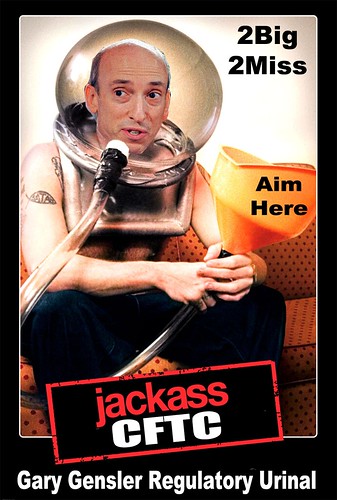Senators put federal regulators, not JPMorgan, on the hot seat
posted on
May 26, 2012 07:22PM

Golden Minerals is a junior silver producer with a strong growth profile, listed on both the NYSE Amex and TSX.

Senators put federal regulators, not JPMorgan, on the hot seat
By Dana Milbank,
May 22
JPMorgan Chase has spent upward of $20 million on lobbying and campaign contributions in the past three years. On Tuesday, the bank received a healthy dividend on that investment.
Its chairman, Jamie Dimon, has admitted that the firm was “sloppy” and “stupid” in making trading bets that lost $2 billion. But Republicans on the Senate Banking Committee wouldn’t hear of it; they preferred to blame government.
As the panel held the first hearing on the JPMorgan losses, Sen. Richard Shelby (Ala.), the committee’s ranking Republican, glowered at federal regulators and charged that they “didn’t know what was really going on.”
“When did you first learn about these trades?” Shelby inquired.
Gary Gensler, head of the Commodity Futures Trading Commission, admitted that he had learned about them from press reports.
“Press reports!” Shelby echoed, with mock surprise. He smiled. “Were you in the dark?”
Gensler tried to explain that his agency does not yet have authority to regulate the bank, but Shelby interrupted. “So you really didn’t know what was going on .?.?. until you read the press reports like the rest of us?” he asked again.
“That’s what I’ve said,” Gensler repeated.
But Shelby wanted him to keep saying it. “You didn’t know there was a problem there until you read the press reports?”
Shelby’s performance was worth every bit of the $72,950 JPMorgan Chase and its employees have given him in the past five years, making the bank his second-largest source of campaign cash. It was a remarkable bit of jujitsu: The trading scandal at JPMorgan highlighted the urgent need for tougher regulation of Wall Street, but Shelby’s harangue was part of a larger effort to use the scandal as justification to repeal regulations.
JPMorgan has a long and colorful history in Washington, but this may have been the most absurd episode since 1933, when J.P. Morgan Jr. sat waiting to testify before the same Senate committee on the 1929 crash and a circus dwarf hopped onto his lap and posed for photographs.
Dimon himself has speculated that the firm’s misbehavior would increase pressure for more regulation. But Republicans decided to defend the industry with a strong offense. Republican National Committee Chairman Reince Priebus set the message when he said this month that the JPMorgan episode showed “Dodd-Frank didn’t work.” http://tiny.cc/sw7vew
This is richer than John Pierpont himself ever was.
It’s true that Dodd-Frank, the legislation responding to the 2008 economic collapse, hasn’t worked — because it hasn’t been put in place. At the heart of the proposed reforms is the “Volcker rule,” named for a former Federal Reserve chairman, which attempts to separate banks’ gambling from their government-backed deposits. This mimics the situation before the Depression-era Glass-Steagall law was repealed in 1999.
Banking lobbyists managed to weaken the Volcker rule in 2010 by securing exemptions ( http://tiny.cc/ty7vew ). Even the watered-down version has been slowed by a barrage of objections from executives — none louder than Dimon. And regulators haven’t had the funds to keep up with the workload. The result is that key parts of the law haven’t been implemented.
Now industry-friendly lawmakers are using the scandal to discredit never-implemented regulations. Although reformers hoped the JPMorgan losses would give them momentum, it’s a good bet the company will win the argument, if only because it holds so many IOUs.
According to data compiled by the Center for Responsive Politics ( http://tiny.cc/ya8vew ), most senators on the Banking Committee have received sizable checks from JPMorgan and its employees over the past five years. They are the largest source of funds for Republicans Bob Corker (Tenn.), $61,000, and Mike Crapo (Idaho), $33,982, and the committee’s Democratic chairman, Tim Johnson (S.D.), $38,995. They gave $108,800 to Mark Warner (D-Va.), $34,800 to Chuck Schumer (D-N.Y.) and lesser amounts to three other members. The group also found that 38 members ( http://tiny.cc/ce8vew ) of Congress, including three on the committee, were JPMorgan shareholders as of 2010.
As the hearing began Tuesday, Securities and Exchange Commission Chairman Mary Schapiro argued that JPMorgan’s activities would have been more easily monitored “if the Dodd-Frank rules had been in place.”
But the Republicans were more inclined to blame the Dodd-Frank law itself — tiptoeing past the awkward fact that it hasn’t been in force. Corker predicted that “the American people are going to wake up” and realize “this big Dodd-Frank bill really doesn’t address real-time issues.” Nebraska Republican Mike Johanns added his concern that “regulations become more and more onerous.”
And Pennsylvania Republican Pat Toomey judged that “we’ve gone down the wrong road” with Dodd-Frank. The better course, he said, is a less intrusive plan that would “let the people in the marketplace make the decisions they will make.”
Sounds nice. But that’s what gave us 2008.
http://www.washingtonpost.com/opinions/senators-put-federal-regulators-not-jpmorgan-on-the-hot-seat/2012/05/22/gIQAPmv8iU_story.html

